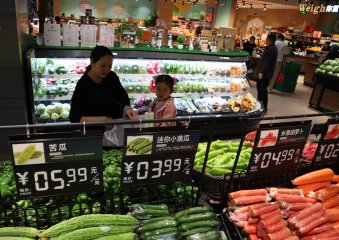
BEIJING, Aug. 13 (Xinhua) -- Although China's consumer prices ticked up in July, analysts expected its inflation pressure to remain mild in the second half of 2019.
The consumer price index (CPI), a main gauge of inflation, rose by a 17-month high of 2.8 percent in July, up from an increase of 2.7 percent registered in June, according to the National Bureau of Statistics.
The pick-up was mainly attributed to higher food prices, which accounted for a large proportion in the CPI calculation, as pork prices continued rising because of the African swine fever while adverse weather affected vegetable supplies.
The government aimed to keep the CPI increase at around 3 percent this year.
The country's overall consumer prices would remain stable as the impact of structural factors would gradually fade with rising supplies, said Yue Xiuhu, an official with the National Development and Reform Commission.
With the outbreak of the African swine fever being effectively controlled, quarantine has been lifted in most affected regions and cross-region transportation of pigs has gradually resumed, according to the Ministry of Agriculture and Rural Affairs.
Measures that the government had put in place would gradually take effect and help ensure market supply and stabilize pork prices, said Wang Zuli, a researcher with the Chinese Academy of Agricultural Sciences.
As the low base effect passes, the upside risk of the CPI may lessen in the third quarter, and the overall CPI may hold flat or edge down in Q3, according to analysts of the China International Capital Corporation Limited (CICC).
The CICC expected the central bank to loosen monetary policy on the margins, further inject liquidity via open market operation instruments, and lower the open market operation rates and reserve requirement ratio during the rest of the year.
The country vowed to keep its prudent monetary policy "neither too tight nor too loose" and make counter-cyclical adjustments in a timely and moderate manner, the central bank said in its second-quarter monetary policy report.




















Latest comments